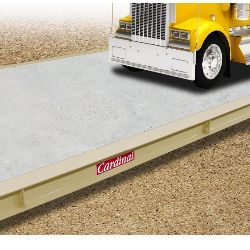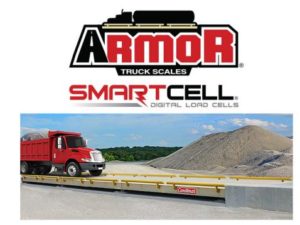It’s common for foundations to outlast truck scale weighbridge, though it can be difficult to find a replacement truck scale with dimensions to match existing foundations.
When planning to replace a truck scale, consider using a low-profile truck scale to eliminate foundation modifications without sacrificing performance.
Legacy truck scale models were manufactured with lower profiles, meaning most standard truck scales currently produced don’t fit these existing foundations.
Solutions for Replacement Truck Scales
The solution is to find a manufacturer who can provide truck scales designed to fit existing foundations. Some manufacturers will create replacement truck scales as special or custom models. These truck scales come with a longer lead time and a higher price because extra time is needed to design and manufacture the scale.
Other truck scale manufacturers may offer standard models designed to fit the foundations of their older truck scale models. These manufacturers provide a standard steel deck or concrete deck weighbridge that can be installed only after extensive modifications are made to other existing foundations.
Basically, not all manufacturers take the same approach to providing replacement truck scale solutions to fit existing foundations.
Rice Lake Low Profile Truck Scale
The Rice Lake Weighing Systems SURVIVOR OTR-LP is Rice Lake’s answer to the need for low-profile, replacement truck scales to fit existing foundations.
The OTR-LP was specifically designed to fit the most common foundation sizes and because they are offered as standard models, there are minimal lead times and lower costs since it’s not a custom scale. With a diamond plate steel deck and the same rugged construction SURVIVOR scales are known for, the OTR-LP is the ideal replacement solution.
Rice Lake works with a nationwide network of certified dealers to ensure each application gets the support they need.
Rice Lake Weighing Systems is a family-owned, ISO 9001 certified corporation, and has been manufacturing and distributing weight-related products and supplies since 1946. Within the company, progressive new technologies merge with the wisdom of industry experience to create the future of weighing through cutting-edge research and design.
Rice Lake’s roots are planted firmly in the principles of quality and customer service. Through three generations of family ownership, these ideals remain unchanged. Today, Rice Lake Weighing Systems is a global leader in measurement and automated process control.
Rice Lake offers more than 40,000 products, with over one million items in stock and available for same- or next-day shipping. The company continues to lead the industry in technological advances and quality products, all with legendary customer service.


